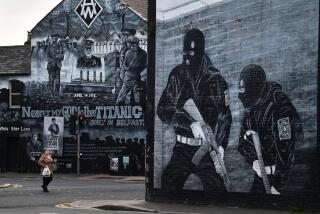Malta Is Struggling to Put Aside Longstanding Partisan Passions
- Share via
VALLETTA, Malta — After 25 years of independence, the Maltese are still having trouble reconciling political differences that have kept them sharply divided, often with bloodshed--or the kind of turmoil that saw the armed forces commander thrown into the sea.
Partisan passions generally simmer near the boiling point on the Mediterranean island nation, which has a history of foreign domination going back about 2,000 years to the Phoenicians, Greeks, Carthaginians, Romans, Saracens, Normans, Knights of Malta, French and British.
Political disputes are fierce and often argued with firearms.
Most recently, the two major political parties could not even get together to mark the anniversary of independence gained from Britain on Sept. 21, 1964.
Socialist Party leaders boycotted the celebrations on ground that the governing Nationalist Party did not consult them about the plans.
National reconciliation is a much discussed political issue that so far has remained only talk.
Party rivalry is bitter, enduring and often violent.
Leo Brincat, a Socialist Party official, maintains that the single biggest failure of Prime Minister Eddie Fenech Adami’s 2-year-old Conservative government is its inability to bring about national reconciliation.
‘Mockery of Reconciliation’
“It makes a mockery of reconciliation,” he said.
The Nationalists, in turn, blame the Socialists for the partisan fighting and for the outbreaks of political violence and hooliganism that it inspires.
“I think the political leadership in the opposition party believes that an attitude of reconciliation could be considered by several of its followers as a capitulation,” said Deputy Prime Minister Guido de Marco.
In June, several hundred Socialist supporters violently disrupted the wedding, attended by the prime minister, of the daughter of a prominent Nationalist Party politician.
Police said 29 people were injured, including 10 policemen by gunfire, when police clashed with the crowd that shouted insults at the bride and pelted her with garbage and rabbit skins outside the church. Rabbit skins apparently were used because one of the prime minister’s names, Fenech, means rabbit in Maltese.
On March 31, Brig. John Spitieri was overpowered by a mob as he took the salute at the Freedom Day parade, hit on the head with his ceremonial sword and tossed into the sea.
That unceremonial dunking of the armed forces commander was typical of the turbulent nature of politics on this rocky, sun-baked island of 340,000 people.
20 Hospitalized
At least 20 people were hospitalized with gunshot wounds after clashes at rallies that preceded the razor-thin 1987 election victory for Fenech Adami and his Conservative Party. One Nationalist Party activist was shot to death at a party clubhouse in what colleagues called a political murder.
After the election, Fenech Adami immediately began to alter the course the Socialists set for Malta during their 16 years at the helm. He moved the country away from the Soviet Union and Libya and closer to the United States and the European Community.
He scratched a clause from the preamble of a 1981 treaty with the Soviet Union that said Malta would consult with Moscow in case of a threat to peace and quickly scrapped part of a 1984 treaty with Libya that called for an exchange of military and security information.
Former Maltese officials have said that half an hour before the U.S. air raids on Libya in April, 1986, Maltese air traffic controllers warned Libya that the warplanes were en route.
Fenech Adami has said Malta wants to retain friendly relations with Libya, which lies 87 miles to the south, and intends to renegotiate the 1984 friendship treaty with Libya that expires in November. But his government is looking to the West to help its sagging economy.
The government is seeking full membership in the European Community and has liberalized its tax laws in an effort to lure foreign investment.
Socialists complain that the Conservatives are simply compromising Malta’s treasured neutrality and constitutionally mandated commitment to non-alignment. They also assail the Conservatives’ economic approach.
Deputy Prime Minister De Marco acknowledges that there has been no rush of foreign investment but says such things take time.
Some foreign companies have come to Malta, but not nearly as many as the conservatives had hoped.
More to Read
Sign up for Essential California
The most important California stories and recommendations in your inbox every morning.
You may occasionally receive promotional content from the Los Angeles Times.











